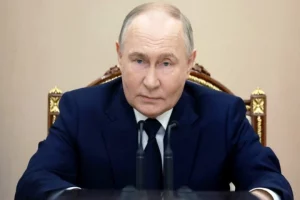Aaryaman Nijhawan
The famous Chinese military strategist and philosopher Sun Tzu said: “If you know yourself but not the enemy, for every victory gained you will also suffer a defeat”. And that is what the West has been stumbling over time and again with Russia.
Despite being fascinated and obsessed with Russia for the better part of the 20th century, it is a wonder that the US (and Europe by extension) still misunderstands the Russian people and are as clueless about Moscow as during the early post-World War Two years.
The recent, premature declarations of “bringing Russia to its knees” and “making it pay” through the Xth round of sanctions, perfectly illustrates this point. Regardless of being under a “tsunami of sanctions” as some like to put it, the Russian economy has remarkably managed to stay afloat, albeit by taking on some water in the choppy seas of sanctions. This resilience, which might confound some experts in the Western Hemisphere, has actually been in the making since 2014.
Putin says sanctions against Russia failed:
“They want to make the people suffer, but their calculation did not materialise. The Russian economy and the management turned out to be much stronger than they thought” pic.twitter.com/IccKQ1fhDv
— Citizen Free Press (@CitizenFreePres) February 21, 2023
In 2014, following the takeover of Crimea, Russia was placed under quite comprehensive blankets of sanctions. Although having quite a negative impact in the initial months, the Kremlin quickly went to work in trying to forge Russian alternatives to most of the products. The Mir banking system is a prime example of this.
As soon as Mastercard, Visa and Maestro pulled out even as Russian tanks rolling into Ukraine in February 2022, the Russian economy quickly shifted to the Mir banking payment system which helped in averting catastrophic economic chaos. Sanctions, for their part, have clearly reached a climactic point of maximum pressure. The only issue is, Russia can withstand that pressure contrary to popular beliefs.
Perhaps the issue at heart, does not lie with the fact that West hasn’t learned from its enemy, but instead that it has failed horribly at making a friend out of Russia. To understand if such a scenario, incredulous at best and utterly impossible and insane at worst, can even exist it is important to understand how the Russian people view and understand the world around them. Russians share something deeply similar and at the same time deeply dissimilar with the American people. The similarities lie in the fact that both the Russians and the Americans share a deeply messianic view of their countries. Staunchly believing, even to a fault, that their nation is destined to the top of the international hierarchy of states, they both assume that being accorded a sphere of influence due to the categorical importance of their nation is a given. This belief runs to the very heart and core of what it means to be a Russian or an American.
This also helps explain why the end of the Cold War is perceived so differently in Russia, compared to the US or Western Europe. For the Russians, the Cold War didn’t end when the Soviet Union collapsed in 1990, but in Malta in 1989 when the General Secretary of the USSR Mikhail Gorbachev and the United States of America shook hands and formally ended it.
However, they quickly diverge from here. The Russian people are structural realists to the core, understanding, viewing and seeing the world around them in stark shades of grey. There is a reason Mearsheimer, the father of Offensive structural Neorealism, finds a ready audience in Russia. For the Russian people, there is no black and white, no forever forces of good pitted against forces of evil, no white knights in the world that ‘liberate’ nations just to altruistically ‘spread democracy and freedom for all’.
For the Russians, in the big, bad world nothing comes for free and everyone is concerned for their own self-interests. In this situation, a friend is one who sticks together even when times are hard and who will not turn his back on you and sell you out for personal gain.
In comparison, the United States of America lies on the complete other end of the spectrum. The US follows a neo-liberalist, even sometimes a Wilsonian outlook of the world, punctured periodically by knee-jerk realist reactions when its idealism sometimes strays too far from the anarchical realities of the world. The US government’s complete U-turn on its attitude towards the Venezuelan government of Nicolás Maduro is a perfect case in point.
Previously denounced as a ‘dictatorial regime’ and placed under multiple rounds of economic sanctions, the United States supported Juan Guaidó as the rightful, democratic and just leader that Venezuela deserves. However, after the crisis in Ukraine came to a head in February 2022, in a bid to isolate Russia and to wean Europe off its dependence on Russian oil and gas, the US policy made a drastic shift as top government officials quietly met with the Maduro regime to discuss the issue of supplying oil to European partners. The bad guys became the good guys in a blink of an eye, creating one more realist ripple, another reality-check rupture in the idealist fabric of the narrative spun by the US government.
Such a move warrants highlighting a fundamental and familiar echo enunciated by Morgenthau, the famous classical realist thinker, in 1949 when it criticized the Truman doctrine for articulating ‘moral values’ like freedom and democracy as the basis of its foreign policy. This hypocrisy is at the heart of the Russian grudge with America and its subsequent dealings at the international level.
This brings us to the heart of the issue for Russians at the core of the Ukraine crisis – the gradual and steady expansion Eastwards of NATO. As George Kennan argued in his famous Long Telegram, the Soviets and consequently the Russians have always been sensitive about being encircled by antagonistic alliances – and NATO isn’t viewed as a friendly alliance. Consequently, there are a couple of sore points that don’t sit well with Moscow.
Firstly, the expansion Eastwards invades and encroaches upon the traditional erstwhile Russian sphere of influence. True, this dominant neorealist viewpoint doesn’t sit well with the “equality of all nations being sovereign and independent” but there is a widespread belief in the country that this isn’t possible since there will always remain difference in capabilities among states which would, intentionally or unintentionally, make them unequal in the long run.
Opponents of this viewpoint would be sensible to note the varying degrees of support the West vocalizes when differing nations are undergoing a crisis – 1994 Rwandan Genocide, 2014 Yemeni civil war, 2013 Sudanese civil war, and the migrant crisis in Europe. The varying degrees of spotlight these subjects ‘deserve’ on media channels clearly highlights the foreign policy priorities of the governments involved.
Secondly, Moscow often sees through the Western vocalizations of democracy, freedom and human rights for what they are – a narrative to further their own foreign policies. It is the single-most crucial factor for the collapse of the international notion of R2P or Responsibility to Protect. Therefore, in their eyes, the expansion of NATO for the purpose of ‘spreading peace and security’ seems illogical to them, but maybe not to the people residing under NATO’s security umbrella.
That is primarily the reason why the United States missed a very crucial opportunity on making Russia an ally in the early post-Cold War years. Apparently intoxicated on Fukuyama’s End of History proclamations and the ultimate triumph of Western democracy, the US didn’t consider the newly independent Russian state to be much of a threat and consequently but unfortunately pushed it down in its foreign policy priorities.
Russian requests for admittance into NATO were met with quiet non-committance or dismissals and delays on trivial technical grounds, when in fact the Western powers weren’t confident about how European security would evolve if they acceded. Russia formally even participated in America’s Global War on Terror by allowed American bases to operate in Central Asia, which it had never done before. Sadly, it wasn’t enough to elicit a change in the approach of Western governments towards Moscow.
Constantly neglected, the chorus grew within the Russian messianic state for following a more independent foreign policy rather than just trudging along with Western narratives. The famous U-turn over the Atlantic by the then-Russian Prime Minister Yevgeny M. Primakov on hearing about the commencement of NATO bombings of Yugoslavia symbolized this approach.
Since then, the Kremlin has often operated on a policy of a strict quid pro quo. After the expulsion of Russian diplomats from the Baltic States in March 2022, Russia followed suit with its own expulsions of diplomats from the three Baltic countries. Similarly, in response to imposition of sanctions and expulsion of its diplomats from Poland and the US, Russia imposed its own counter-sanctions and requested the return of Polish and American officials from its territory.
While the West might contend that the sanctions were to ‘punish’ Russian authorities for their actions, the fact remains that Moscow quietly but pertinently observes the actions of fellow nations and responds in kind.
A possible explanation of the development of such misunderstandings might be due to a general decline in genuine scholarly interest and drive to understand Russian perspectives in the post-Cold War days. In an era where some consider China to herald in a new Cold War, the focus on Russian Studies in the West has definitely undergone a downward spiral, if not an outright descent into intellectual obscurity. Comparatively, emerging nations like India which try to play a more neutral and balanced stance in international affairs, at times portray a more realistic and deeper understanding of Russian interests rather than Western commentators.
However, the unfortunate takeaway remains that in the United States and elsewhere, the famous Mr. X has been trumped by the more exuberant and flamboyant Fukuyama, especially in terms of Western foreign policy agendas towards Russia. The consequences of such misunderstandings are generally high, and sadly they’re currently being felt keenly in European electricity bills while the money flows into American coffers.
(Aaryaman Nijhawan is currently pursuing his M.A. in International Relations from Moscow State Institute of International Relations (MGIMO University) and is a research intern at Moscow School of Management SKOLKOVO)
Also Read: How India and Russia are benefitting from Western sanctions against Moscow




















